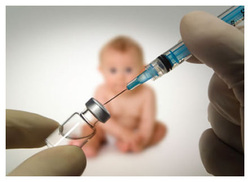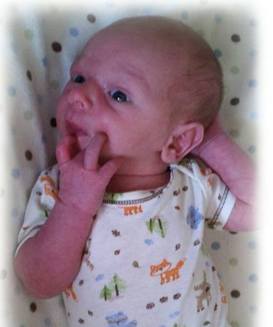|
Sometimes we focus so much on the pregnancy and birth, that we forget about what happens after the baby is born! As with other aspects of pregnancy and birth, it's important to remember that most of these routine interventions have their place....but only when indicated. There isn't much evidence that supports their routine use in ALL babies as is "standard of care" in most US hospitals. You can examine the evidence for yourself and see if you would like these interventions to be a part of your baby's first few hours or days. You might want to add newborn procedure preferences to your birth plan, and I also recommend having a person with you at your birth who is clear on what you want and don't want done to your baby. It's easy for the new mother to get caught up in the moment when meeting her new baby, and rightly so! But she may not notice some of these procedures taking place, because they are sometimes very quick!  Hepatitis B Vaccine According to the CDC, those at greatest risk for developing serious hepatitis B infections are individuals sharing needles, syringes, or other drug-injection equipment, or through sexual contact with an infected person. Does this sound like your newborn? Babies born to mothers who are infected may have up to a 90% chance of contracting the disease, and this is one of the diseases that nearly all pregnant women in the US are screened for early in pregnancy. Interestingly enough, a recent study found that even in vaccinated babies and mothers, 42% of babies still became infected. But that's a topic for another day. In most recent years, less than 500 infants become infected with Hepatitis B, most of them to mothers who carry it. What does this mean for parents who know that they do not carry Hepatitis B? Weigh the risk of the vaccine with the risk of contracting the disease. This article reports that in 1996, 279 total cases of Hepatitis B were reported in children under 14 in the United States. In that same year, there were 872 adverse events reported following the Hepatitis B vaccine or one containing Hep B. Considering that many adverse events are not reported (it's estimated that only 1-10 percent of vaccine injuries are reported, and newborns are not able to communicate specifically about what they're feeling, the number of adverse events following the vaccine is likely much higher. Why is this vaccine recommended for infants within 12 hours of life? The National Vaccine Information Network (NVIC) states "The primary reason that the CDC recommended hepatitis B vaccination for all newborns in the United States in 1991 is because public health officials and doctors could not persuade adults in high risk groups (primarily IV drug abusers and persons with multiple sexual partners) to get the vaccine." Did you get that? Although infection rates are relatively low in this country, especially for children, your baby receives this vaccine because adults at risk can't be truste usually don't get vaccinated. There are a few problems with this reasoning. Firstly, no controlled or observational studies comparing unvaccinated babies with babies receiving the vaccine have ever been done. Does this worry you as much as it does me?! Many parents have expressed that their babies experience breathing difficulties, seizures, and even infant death has been reported (over 1500 on the VAERS as of March 2012), but these concerns are rarely taken seriously. Why might the vaccine be so toxic to your baby? I'm just going to address one of my concerns today. Aluminum in the Hepatitis B vaccine. Mercury used to be the additive of choice, but has been phased out of most vaccines. Aluminum, a metal that is not found in the body and is not needed for any bodily process is added to increase the immune response to the antigen. According to the FDA, a 12- pound 2 month-old should be able to handle 30 mcg of aluminum per day. Say you have a 7 pound newborn whose kidneys and liver aren't even up to full functioning ability yet. We'll be generous and say that 20 mcg of aluminum MAY be safe. How much aluminum is in the Hep B vaccine for infants? 250 micrograms of aluminum. Is it any wonder that this is a potentially damaging vaccine to your newborn? Excess aluminum is now being tied to conditions such as Chronic Fatigue Syndrome, breast cancer, and Alzheimers, and yes, autism. A baby who receives a series of Hepatitis B vaccines at 1 day, 2 months, 4 months, and 6 months of age would be injected with 1000 mcgs of aluminum just from that one vaccine. Do the advertised benefits of this vaccine outweigh the risks? That is something that only you, the parent, can decide, and you should be supported in the decision that you make. My goal is only to provide information so that you are comfortable with your decision. If you wish to avoid this vaccination for your newborn, please add this desire to your birth plan, and also state verbally that you do not want the shot at the hospital, preferably before the baby is born. You may have to sign a waiver, but legally you have the right to refuse this intervention, and you wouldn't be the first or last to do so. Next time...Delayed Cord Clamping vs. Immediate Cord Clamping.
0 Comments
Leave a Reply. |
Author- Sara
I look at birth from the perspective that our bodies are wonderfully made, and if we really believe that and work with the birth process and nourish our bodies properly, they will function optimally, most of the time! Archives
November 2019
Categories
All
|

 RSS Feed
RSS Feed
